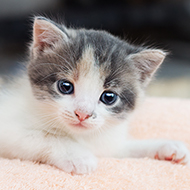Public urged not to buy kittens on impulse

There was a 667 per cent rise in online searches for 'kittens near me' in July.
Members of the public are being urged to do their research before getting a pet, as new figures reveal a sharp rise in the number of people wanting to buy or rehome kittens this summer.
According to figures published by the RSPCA, there was a 667 per cent rise in online searches for 'kittens near me' in July, a sixfold increase on the same period last year. The animal charity also noticed a sharp spike in searches for kittens during the coronavirus lockdown, with a 188 per cent increase within just a few months.
Cat welfare expert Alice Potter said: "It's fantastic that so many people are interested in bringing a cat into their home this year. However, with such high increases in people searching for kittens online, it's important that prospective owners are doing their research and not buying a kitten on impulse.
“This means making sure they have the time, money and resources to care for a cat for the rest of their lives, but also ensuring that if buying a kitten they're buying a healthy and happy kitten from a responsible breeder.”
The figures come during Adoptober, an initiative designed to showcase the benefits of rehoming a rescue pet. According to the RSPCA, there was a 114 per cent increase in the number of people searching for cats to adopt during the lockdown on its Find a Pet resource, compared to the previous year.
Alice added: "It's great to see so many people are looking to adopt a rescue cat with more than a million people visiting our Find a Pet during the pandemic.
"We are braced for a kitten season boom next year as routine neutering procedures had to be put on hold during the lockdown. This means that whilst the UK is already facing a cat overpopulation crisis, we may now see even more unplanned litters of kittens. If you've got a kitten during lockdown, it's so important to get them booked into your vets for a spay or a snip.”



 The veterinary mental health charity Vetlife is inviting the veterinary community to join it for a sponsored cold-water dip.
The veterinary mental health charity Vetlife is inviting the veterinary community to join it for a sponsored cold-water dip.